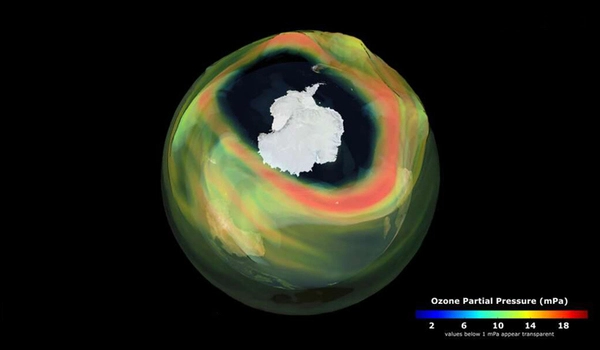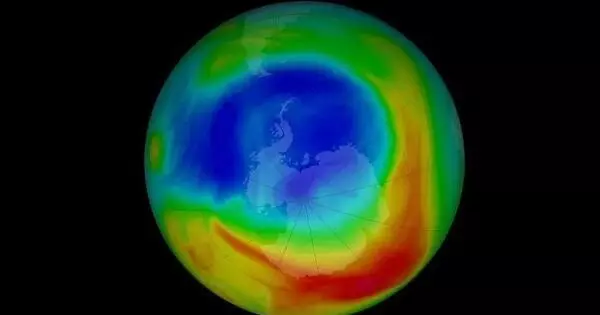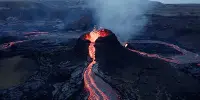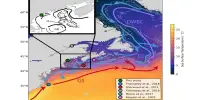Scientists are attempting to determine the impact of a new year-round ozone hole above the tropics on the ecosystem and humankind. The ozone layer’s depletion can result in increased ground-level UV radiation, which can increase the risk of cancer and weak immune systems, as well as have an impact on agricultural productivity and ecosystems. This ozone hole is seven times the size of the well-known Antarctic ozone hole. The tropical and polar ozone layers are also important in keeping tropical and polar regions at livable temperatures.
Scientist reveal a large, all-season ozone hole in the lower stratosphere over the tropics comparable in depth to that of the well-known springtime Antarctic hole, but roughly seven times greater in area. The observed data agree well with the cosmic-ray-driven electron reaction (CRE) model and strongly indicate the identical physical mechanism working for both Antarctic and tropical ozone holes.
According to a Canadian researcher, an ozone hole seven times larger than the Antarctic ozone hole has been present over tropical regions since the 1980s. Qing-Bin Lu, a scientist from the University of Waterloo in Ontario, Canada, reports in AIP Advances that a large, all-season ozone hole – defined as an area of ozone loss greater than 25% compared to the undisturbed atmosphere – in the lower stratosphere over the tropics is comparable in depth to the well-known springtime Antarctic hole, but its area is roughly seven times greater.
The existence of the tropical ozone hole may cause a great global concern. The depletion of the ozone layer can lead to increased ground-level UV radiation, which can increase risk of skin cancer and cataracts in humans, as well as weaken human immune systems, decrease agricultural productivity, and negatively affect sensitive aquatic organisms and ecosystems.
Qing-Bin Lu
“The tropics constitute half the planet’s surface area and are home to about half the world’s population,” said Lu. “The existence of the tropical ozone hole may cause a great global concern. The depletion of the ozone layer can lead to increased ground-level UV radiation, which can increase risk of skin cancer and cataracts in humans, as well as weaken human immune systems, decrease agricultural productivity, and negatively affect sensitive aquatic organisms and ecosystems.”
Lu’s discovery of the ozone hole surprised his colleagues in the scientific community because it was not predicted by conventional photochemical models. His observations agree well with the cosmic-ray-driven electron reaction (CRE) model and strongly suggest that the same physical mechanism is at work for both Antarctic and tropical ozone holes.
At the center of the tropical ozone hole, as with the polar ozone hole, approximately 80% of the normal ozone value is found to be depleted. According to preliminary reports, ozone depletion levels over equatorial regions are already endangering large populations, and the associated UV radiation reaching these regions is far greater than expected.

In the mid-1970s, atmospheric research suggested the ozone layer, which absorbs most of the sun’s ultraviolet radiation, might be depleted because of industrial chemicals, primarily chlorofluorocarbons (CFCs). The 1985 discovery of the Antarctic ozone hole confirmed CFC-caused ozone depletion. Although bans on such chemicals have helped slow ozone depletion, evidence suggests ozone depletion persisted.
Lu said the tropical and polar ozone holes play a major role in cooling and regulating stratospheric temperatures, mirroring the formation of three “temperature holes” in the global stratosphere. He said this finding may prove crucial to better understanding global climate change.
Lu’s discovery builds on previous studies of the CRE-initiated ozone-depleting mechanism that he and his colleagues originally proposed about two decades ago.
“The current discovery necessitates additional careful studies of ozone depletion, UV radiation change, increased cancer risks, and other negative effects on health and ecosystems in tropical regions,” Lu said.
It’s unclear whether the tropics ozone hole is something we should be concerned about, but Li says it’s definitely not a good thing. According to the press release, large populations along the equator are already threatened by the depleting ozone layer due to the amount of UV radiation that is allowed in. The tropical and polar ozone layers are also important in keeping tropical and polar regions at livable temperatures.
Furthermore, as previously stated, the depleting ozone allowing increased UV radiation can increase the risk of skin cancer and cataracts in humans, as well as a weakened immune system. It can also have an effect on agricultural productivity. It can have a negative impact on marine life and entire ecosystems on Earth. Needless to say, it’s something we should keep in mind when taking environmental action.
















